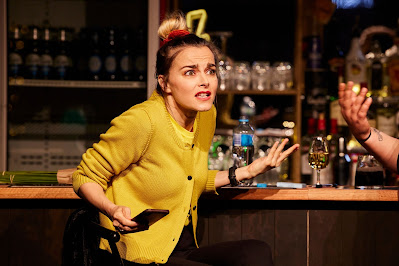 |
| Bojana Novakovic in The Blind Date Project Photo by Claudio Rascella |
The Blind Date Project.
Created by Bojana Novakovic and Mark Winter, Devised with Thomas Hemming and Tanya Goldberg. Performed by Bojana Novakovic and a new guest performer every night. Lucy Moir as the Karaoke Queen. Directed by Tanya Goldberg. Produced by Andrew Carlberg and Bojana Novakovic. The Artspace. Adelaide Cabaret Festival. Adelaide Festival Centre. June 11 – June 25 2021
Reviewed by Peter Wilkins.
Improvisation is the theatre’s
tightrope act. One false step and it\s a long way to fall. But if you can cross
the high-wire and reach the other side it can be magical, exhilarating and
riveting for performer and audience. The
Blind Date Project , devised by performer Bojana Novakovic and Mark Winter
in collaboration with Thomas Hemming and director Tanya Goldberg is a risky
experiment in the thrills and spills of human communication.
Bojana Novakovic
plays Anna, a lesbian winemaker in search of a lasting relationship. Each night
she arrives at the Karaoke Klub and sits at the bar waiting for a person to
arrive with whom she has connected on the Net. On this particular night Audrey
(Tilda Cobham-Hervey), a young woman who has given up her career in finance to
find creative satisfaction working part time in an art gallery has responded to
the online invitation and meets Anna for the first time at the bar of the club.
 |
| Tilda Cobham-Hervey is Anna |
What ensues is a tentative traverse of the complexities and desires inherently concealed in the desperate need for a meaningful relationship. The more experienced, yet insecure older Anna craves a loving partnership with a younger woman. Audrey, reeling from an unhappy long term relationship with a man now seeks the solace and love of a woman in the belief that it may provide the true love that she seeks. Each is vulnerable. Each treads tentatively on the tightrope. Each is exposed to the risk of the slip that can collapse the hope of achievement. It is this tension, played with total credibility by both actors, that feeds the audience’s fascination with the ensuing conversation and the intriguing curiosity in the outcome.
Although improvisational in its
unscripted dialogue, I suspect that director Goldberg has carefulyy signposted
the narrative arc, providing directions to Audrey via SMS, cleverly disguised
as conversation with her mother, father and boyfriend. There are enough interventions
to ensure that the performance does not falter and each actor can cross the
tightrope from the beautifully played awkwardness of the initial meeting through the cat and mouse game
of sexual attraction to the ultimate epiphany. What is revealed is a tight
structure to the meeting, but an uncertainty in the playing at times that the
existence of a tightly scripted text could have avoided. But that is neither
the nature nor the purpose of this invention. It is an experiment and as such
it is the potential dangers of such an
experience that creates the interest and attracts the audience’s fascination.
Karaoke Queen, Lucy Moir
introduces the show with Karaoke singalong lyrics projected on a screen.
Popular songs by Nat King Cole, Bruce Springsteen and the Beatles set the scene
before Anna enters through the audience in her leopard skin coat. She strikes a
lonely, searching woman as she sits at the bar. Audrey arrives clutching a
bunch of flowers and dressed in a slack suit to impress the lesbian she has
come to meet. The scene is set and the game of human communication begins.
During the performance, Anna breaks from the seat to sing Gloria Gaynor’s
stirring anthem of survival. At another point Audrey takes to the karaoke stage
with Strangers in the Night. Could
these two very different women ever be anything else?
Seated at tables with their ice
buckets, bottles of champagne and drinks from the bar, the audience is drawn
into the intimacy of this unusual meeting. The
Blind Date Project appeals to the fascination with other people’s lives,
their hopes, their dreams and their desperate search for true love. At times
the conversation falters slightly until another cue brings it back on track. At
times Novakovic’s lines are rushed and difficult to hear as improvised dialogue
momentarily teeters before once again regaining
control.
The Blind Date Project holds a mirror up to humanity’s deepest need
– to be loved for whom you are. The performance, skirting the precipice of
improv reminds us that love, whether sexual or spiritual, between any sex or
any gender is still love. As an experiment, The
Blind Date Project teases our innate curiosity. As a production it opens
our eyes through this simple insight into the lives of two ordinary women and
the extraordinary nature of the human condition. It is an experiment that takes
the risks and invites you to gaze past the reflection and look deep into the
mirror of our lives.